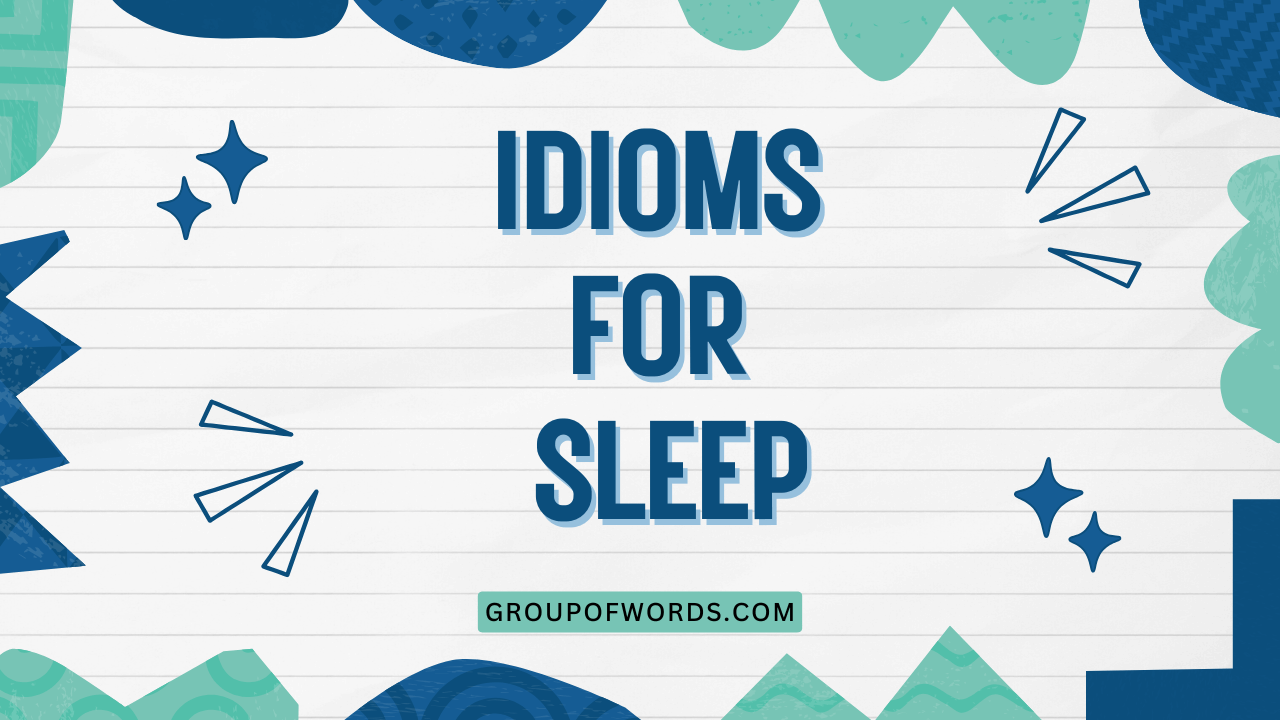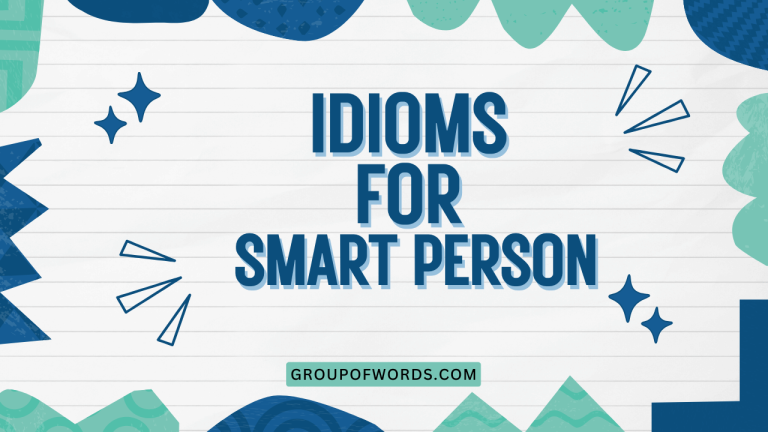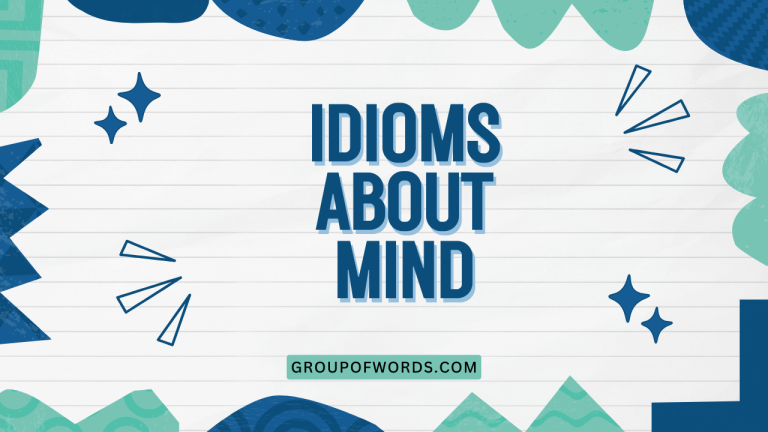Idioms for Sleep: Mastering English Expressions
Understanding idioms is crucial for mastering the English language. Idioms add color, depth, and cultural context to communication.
While grammar rules provide the structure, idioms offer a way to express ideas in a more nuanced and engaging manner. This article focuses specifically on idioms related to sleep, an everyday topic with a wealth of idiomatic expressions.
This guide is designed for English language learners of all levels, from beginners looking to expand their vocabulary to advanced speakers aiming to refine their understanding of colloquial English. By exploring these idioms, learners can improve their comprehension skills, enhance their speaking fluency, and gain a deeper appreciation for the richness of the English language.
This comprehensive guide will not only define and explain various idioms related to sleep but also provide numerous examples, usage rules, and practice exercises. By the end of this article, you will have a solid understanding of sleep-related idioms and be able to confidently use them in your daily conversations and writing.
Table of Contents
- Definition of Idioms for Sleep
- Structural Breakdown of Sleep Idioms
- Types of Sleep Idioms
- Examples of Sleep Idioms
- Usage Rules for Sleep Idioms
- Common Mistakes with Sleep Idioms
- Practice Exercises
- Advanced Topics in Sleep Idioms
- Frequently Asked Questions
- Conclusion
Definition of Idioms for Sleep
An idiom is a phrase or expression whose meaning cannot be understood from the literal meanings of its individual words. Instead, idioms are figurative expressions that have a specific meaning known to native speakers of the language.
Idioms related to sleep are phrases that describe various aspects of sleeping, such as falling asleep, being asleep, having trouble sleeping, waking up, and feeling tired. These idioms often use metaphorical language to convey these concepts in a more vivid and expressive way.
Sleep idioms are often culturally specific, meaning their meanings and usage can vary between different English-speaking regions. Understanding these nuances is key to using them correctly and effectively.
For example, an idiom common in American English might not be as widely used or understood in British English, and vice versa.
The function of sleep idioms is to enrich communication by adding color and personality to language. They can make conversations more engaging and help speakers express themselves in a more nuanced and relatable way.
They are a type of figurative language which adds depth and creativity to expression. They are generally informal and are more common in speech than writing.
Structural Breakdown of Sleep Idioms
Sleep idioms, like other idioms, don’t follow strict grammatical rules in terms of word order or tense. Their structure is fixed, meaning the words within the idiom cannot be changed without altering or destroying the idiom’s meaning.
Understanding this fixed nature is crucial for using idioms correctly. While the idiom itself is fixed, it can be incorporated into a sentence with varying tenses and grammatical structures.
Most sleep idioms are phrases, consisting of two or more words. These phrases can function as verbs, adjectives, or adverbs within a sentence.
For instance, the idiom “hit the hay” functions as a verb, meaning “to go to bed.” The idiom “dead to the world” functions as an adjective, describing someone who is sleeping very deeply.
Here’s a breakdown of the structural elements commonly found in sleep idioms:
- Verbs: Many sleep idioms contain verbs related to sleeping or resting, such as sleep, rest, doze, nod, wake, and dream.
- Nouns: Common nouns in sleep idioms include bed, hay, log, world, cat, dog, and shut-eye.
- Adjectives: Adjectives often describe the quality or state of sleep, such as deep, sound, light, dead, and restless.
- Prepositions: Prepositions link words and phrases together to form the idiom, such as off to, out like, under the, and in.
Understanding these structural elements can help learners recognize and interpret sleep idioms more effectively. By paying attention to the verbs, nouns, adjectives, and prepositions used in these phrases, learners can begin to decipher the meaning and usage of each idiom.
Types of Sleep Idioms
Sleep idioms can be categorized based on the specific aspect of sleep they describe. Here are some common categories:
Idioms for Falling Asleep
These idioms describe the act of going to sleep or preparing to sleep.
Idioms for Deep Sleep
These idioms describe a state of profound or sound sleep.
Idioms for Trouble Sleeping
These idioms describe difficulty falling asleep or staying asleep.
Idioms for Waking Up
These idioms describe the act of becoming awake or the state of being awake.
Idioms for Tiredness
These idioms describe the feeling of being tired or exhausted.
Examples of Sleep Idioms
This section provides a comprehensive list of sleep idioms, categorized by their meaning. Each idiom is accompanied by a definition and example sentences to illustrate its usage.
Idioms for Falling Asleep
These idioms describe the act of going to sleep or preparing to sleep. They often convey a sense of anticipation or routine associated with bedtime.
The following table provides examples of idioms for falling asleep, along with their definitions and example sentences. These examples will help you understand how to use these idioms in context.
| Idiom | Definition | Example Sentence |
|---|---|---|
| Hit the hay | Go to bed. | I’m exhausted; I’m going to hit the hay. |
| Hit the sack | Go to bed. | It’s late, and I have to wake up early, so I’m going to hit the sack. |
| Call it a night | Decide to stop an activity for the rest of the evening and go to bed. | After working on the project for hours, we decided to call it a night. |
| Turn in | Go to bed. | I’m feeling tired, so I think I’ll turn in early tonight. |
| Off to dreamland | Going to sleep; entering a world of dreams. | The kids are finally quiet; they’re off to dreamland. |
| Catch some Z’s | Get some sleep. | I need to catch some Z’s before the big meeting tomorrow. |
| Go nighty-night | A childish way of saying goodnight and go to sleep. | Say nighty-night to your grandma before you go to bed. |
| Go to the land of Nod | Go to sleep. | The baby has finally gone to the land of Nod after crying for hours. |
| Say goodnight to the world | Go to sleep. | After such a long day, I’m ready to say goodnight to the world. |
| Take forty winks | Have a short nap. | I’m going to take forty winks before we go out for dinner. |
| Drift off to sleep | Gradually fall asleep. | I drifted off to sleep while listening to a podcast. |
| Drop off | Fall asleep, often unintentionally. | I was so tired that I dropped off in the middle of the movie. |
| Nod off | Fall asleep, usually briefly and unintentionally. | The professor was so boring that many students nodded off during the lecture. |
| Go out like a light | Fall asleep very quickly and easily. | After the exhausting hike, I went out like a light as soon as my head hit the pillow. |
| Succumb to slumber | To give in to the need for sleep. | After a long day of work, he would often succumb to slumber on the couch. |
| Retire for the night | To go to bed for the night. | Having finished all correspondence, the manager decided to retire for the night. |
| Tuck oneself in | To make oneself comfortable in bed before sleeping. | She tucked herself in, eager to read a few chapters before sleeping. |
| Be dead on one’s feet | To be extremely tired and ready to collapse into sleep. | The team was dead on their feet after the intense overtime game. |
| Prepare to slumber | To get ready for sleep. | She began to prepare to slumber by turning off the lights and setting her alarm. |
| Settle down for a snooze | To get comfortable for a short sleep. | He decided to settle down for a snooze on the hammock. |
| Turn down the covers | Prepare the bed for sleeping. | The hotel staff always turn down the covers as part of their nightly service. |
| Lie down to rest one’s weary head | To go to bed because one is very tired. | Following the strenuous journey, the travelers were eager to lie down to rest their weary heads. |
| Nestle into bed | To get cozy and comfortable in bed. | After a warm bath, she nestled into bed with a good book. |
| Prepare for a long winter’s nap | To get ready for a long and restful sleep (often used humorously). | After the Thanksgiving feast, everyone was ready to prepare for a long winter’s nap. |
Idioms for Deep Sleep
These idioms describe a state of profound or sound sleep. They often convey the idea of being completely unaware of one’s surroundings.
The following table provides examples of idioms for deep sleep, along with their definitions and example sentences. These expressions can help you describe the quality of sleep.
| Idiom | Definition | Example Sentence |
|---|---|---|
| Sleep like a log | Sleep very soundly and deeply. | I was so tired that I slept like a log last night. |
| Sleep like a baby | Sleep very peacefully and soundly. | After the marathon, she slept like a baby. |
| Dead to the world | Sleeping very deeply and unaware of anything happening. | He was dead to the world and didn’t hear the thunderstorm. |
| Out like a light | Fall asleep very quickly and deeply. | As soon as his head hit the pillow, he was out like a light. |
| In a deep slumber | Sleeping soundly. | The princess was in a deep slumber until the prince kissed her. |
| Fast asleep | Sleeping soundly. | The children were fast asleep by the time we got home. |
| Sound asleep | Sleeping deeply and peacefully. | The baby was sound asleep in her crib. |
| Sleeping the sleep of the just | Sleeping soundly because one has a clear conscience. | After helping the community, he slept the sleep of the just. |
| Lost in slumber | Deeply asleep and unaware of surroundings. | She was lost in slumber, dreaming of faraway lands. |
| Gone to the world of dreams | Sleeping deeply and dreaming. | The children had gone to the world of dreams, filled with magical adventures. |
| In the arms of Morpheus | Deeply asleep (Morpheus is the Greek god of dreams). | After a long day, he was finally in the arms of Morpheus. |
| Snoring the house down | Snoring very loudly. | My dad was snoring the house down last night; I could barely sleep. |
| Sleeping without a care in the world | Sleeping soundly without any worries. | The puppy was sleeping without a care in the world, curled up on the rug. |
| Oblivious in sleep | Unaware of anything while sleeping. | He was oblivious in sleep to the party happening downstairs. |
| In a state of profound rest | Resting very deeply. | After the surgery, the patient was in a state of profound rest. |
| In the depths of sleep | Sleeping very deeply. | I found her in the depths of sleep, completely relaxed. |
| Sleeping like the dead | Sleeping very soundly and deeply (can sometimes imply being difficult to wake). | He was sleeping like the dead, so I didn’t bother trying to wake him up. |
| Engrossed in dreams | Completely immersed in one’s dreams. | She was engrossed in dreams, her face peaceful and serene. |
| At total rest | Completely relaxed and asleep. | The athlete was finally at total rest after months of training. |
| In a restful state | Being in a state of peaceful sleep. | The meditation helped her enter a restful state quickly. |
| Drowned in sleep | Overwhelmed by the need to sleep and sleeping deeply. | After the exhausting journey, he felt drowned in sleep. |
| Under a spell of sleep | Asleep as if under a magical influence. | The children seemed to be under a spell of sleep, so quiet and still. |
| Lost to consciousness | Unconscious and deeply asleep. | He was lost to consciousness, dreaming vivid dreams. |
| In a world of one’s own | Asleep and dreaming, disconnected from reality. | She was in a world of her own, sleeping peacefully. |
| Sleeping without movement | Sleeping so deeply that one doesn’t move. | The dog was sleeping without movement, completely undisturbed by the noise around him. |
Idioms for Trouble Sleeping
These idioms describe difficulty falling asleep or staying asleep. They often convey a sense of frustration or restlessness.
The following table provides examples of idioms for trouble sleeping, along with their definitions and example sentences. These are helpful for expressing insomnia or restless nights.
| Idiom | Definition | Example Sentence |
|---|---|---|
| Lose sleep over something | Worry about something so much that it keeps you awake. | Don’t lose sleep over such a small problem. |
| Toss and turn | Move around restlessly in bed and have trouble sleeping. | I was tossing and turning all night because I was worried about the exam. |
| Not sleep a wink | Not sleep at all. | I didn’t sleep a wink last night because of the noise. |
| Lie awake | Stay in bed without sleeping. | I lay awake for hours, thinking about the future. |
| Count sheep | Try to fall asleep by imagining and counting sheep. | I tried to count sheep, but it didn’t help me fall asleep. |
| Wrestling with insomnia | Struggling to fall asleep due to insomnia. | He was wrestling with insomnia for weeks before the doctor prescribed medication. |
| Eyes wide open | Unable to sleep, often due to worry or excitement. | I was eyes wide open all night, thinking about my new job. |
| Stare at the ceiling | Be unable to sleep and just look at the ceiling. | I spent the whole night staring at the ceiling, unable to relax. |
| Wide awake at midnight | Being fully awake in the middle of the night. | I was wide awake at midnight, feeling restless and anxious. |
| Having a restless night | Experiencing a night of disturbed and uneasy sleep. | I had a restless night because of the thunderstorm. |
| Fighting sleep | Trying to stay awake when feeling tired. | I was fighting sleep during the boring lecture. |
| Unable to switch off | Unable to relax and fall asleep. | I was unable to switch off after a stressful day at work. |
| Struggling to drift off | Finding it difficult to fall asleep. | I was struggling to drift off because of the bright streetlights. |
| Can’t get any shut-eye | Unable to get any sleep. | I can’t get any shut-eye with all this noise. |
| Tossing and turning in one’s mind | Worrying and thinking restlessly, preventing sleep. | I was tossing and turning in my mind about the upcoming presentation. |
| Having trouble winding down | Finding it difficult to relax before sleeping. | I was having trouble winding down after the intense workout. |
| Being kept awake by something | Being unable to sleep due to a specific reason. | I was being kept awake by the neighbor’s loud music. |
| Having a hard time dozing off | Finding it difficult to fall asleep. | I was having a hard time dozing off because of the caffeine. |
| Being unable to find a comfortable position | Finding it difficult to get comfortable enough to sleep. | I was being unable to find a comfortable position, so I couldn’t sleep. |
| Finding sleep elusive | Unable to achieve sleep, as if it’s avoiding you. | Tonight, I am finding sleep elusive; maybe some warm milk will help. |
| The Sandman is avoiding me | Humorous way of saying you are unable to fall asleep (Sandman is a mythical figure who brings sleep). | The Sandman is avoiding me tonight; I’ve been awake for hours. |
| My mind is racing | Having too many thoughts to fall asleep. | I can’t sleep; my mind is racing with ideas. |
| Clock-watching | Constantly checking the time when unable to sleep. | I spent the night clock-watching, hoping to fall asleep before morning. |
| Restless as a hummingbird | Extremely restless and unable to stay still, preventing sleep. | I was restless as a hummingbird, unable to find a comfortable position. |
| Pacing the floor | Walking back and forth restlessly, unable to sleep. | He spent the night pacing the floor, worried about his sick child. |
Idioms for Waking Up
These idioms describe the act of becoming awake or the state of being awake. They often convey a sense of alertness or energy.
The following table provides examples of idioms for waking up, along with their definitions and example sentences. These expressions can help you describe your morning routine or level of alertness.
| Idiom | Definition | Example Sentence |
|---|---|---|
| Wake up on the wrong side of the bed | Be in a bad mood from the start of the day. | He must have woken up on the wrong side of the bed because he’s been grumpy all morning. |
| Bright-eyed and bushy-tailed | Energetic and enthusiastic, especially early in the morning. | She’s always bright-eyed and bushy-tailed, even at 6 a.m. |
| Rise and shine | Wake up and get out of bed. | Rise and shine! It’s time to start the day. |
| Hit the ground running | Start something with great energy and enthusiasm. | I hit the ground running at work this morning and finished all my tasks. |
| Come to with a start | Wake up suddenly and unexpectedly. | I came to with a start when I heard a loud noise outside. |
| Awake with the lark | Wake up very early in the morning. | Farmers often awake with the lark to tend to their fields. |
| Bleary-eyed | Having blurred vision from being tired or sleepy. | I stumbled into the kitchen, bleary-eyed and searching for coffee. |
| Out of bed at the crack of dawn | Waking up very early in the morning. | She was out of bed at the crack of dawn to go for a run. |
| Rub the sleep from one’s eyes | To physically rub one’s eyes to wake up. | He rubbed the sleep from his eyes and looked at the clock. |
| Shake oneself awake | To physically shake one’s head to wake up. | I had to shake myself awake after the long drive. |
| Wake up refreshed | To feel rested and energized upon waking. | I woke up refreshed after a full night’s sleep. |
| Stir from sleep | To begin to wake up. | She began to stir from sleep when the sunlight streamed through the window. |
| Be jolted awake | To wake up suddenly and with a shock. | He was jolted awake by the loud alarm. |
| Emerge from slumber | To slowly wake up from a deep sleep. | She began to emerge from slumber, feeling groggy. |
| Groggy from sleep | Feeling dazed and confused upon waking. | I felt groggy from sleep and needed coffee to fully wake up. |
| Slow to get going | Taking a long time to become fully awake and active. | I’m always slow to get going in the morning. |
| Wake up on the good foot | Start the day in a good mood. | He woke up on the good foot; everything seemed to go right that day. |
| Spring out of bed | Get out of bed quickly and energetically. | She sprang out of bed, excited for the day ahead. |
| Leap out of bed | Get out of bed quickly and energetically. | He leapt out of bed when he remembered it was his birthday. |
| Peel oneself out of bed | To get out of bed with great effort. | He had to peel himself out of bed to make it to his early shift. |
| Drag oneself out of bed | To get out of bed with great reluctance. | I had to drag myself out of bed on Monday morning. |
| Shake off the cobwebs | To wake up fully and clear one’s mind. | I needed to shake off the cobwebs with a strong cup of coffee. |
| Snap awake | To wake up suddenly and completely. | The loud noise made me snap awake instantly. |
| Catch the early worm | Wake up and start working early to gain an advantage. | She always aims to catch the early worm by arriving at the office before everyone else. |
| Start the day with a bang | Begin the day with energy and enthusiasm. | He likes to start the day with a bang by going for a run. |
Idioms for Tiredness
These idioms describe the feeling of being tired or exhausted. They often convey a sense of weariness or fatigue.
The following table provides examples of idioms for tiredness, along with their definitions and example sentences. These are useful for expressing your level of fatigue or exhaustion.
| Idiom | Definition | Example Sentence |
|---|---|---|
| Dog-tired | Extremely tired. | After the hike, I was dog-tired. |
| Dead tired | Extremely tired. | I’m dead tired after working all day. |
| Beat | Very tired. | I’m completely beat after the marathon. |
| Worn out | Extremely tired; exhausted. | The kids are worn out from playing in the park. |
| Burn the candle at both ends | Work or do things from early in the morning until late at night and therefore get very little rest. | He’s been burning the candle at both ends trying to finish the project. |
| Running on fumes | Continuing to function despite being extremely tired or depleted. | I’m running on fumes; I need a vacation. |
| Ready to drop | Extremely tired and about to collapse. | I’m so tired; I’m ready to drop. |
| Out on one’s feet | Extremely tired and barely able to stand. | After working a double shift, she was out on her feet. |
| Dragging one’s feet | Walking slowly and heavily due to tiredness. | I was dragging my feet all day because I didn’t get much sleep. |
| Feeling the weight of the world | Feeling overwhelmed and exhausted by life’s burdens. | He was feeling the weight of the world after a series of setbacks. |
| Falling asleep on one’s feet | Extremely tired and about to fall asleep while standing. | I was practically falling asleep on my feet during the meeting. |
| Having heavy eyelids | Feeling sleepy and having difficulty keeping one’s eyes open. | I was having heavy eyelids by the end of the movie. |
| At the end of one’s rope | Feeling completely exhausted and unable to cope. | I’m at the end of my rope; I need a break. |
| Like death warmed over | Looking and feeling extremely unwell and exhausted. | I feel like death warmed over after that flu. |
| Run-down | Feeling tired and in poor health. | I’ve been feeling run-down lately; I should probably see a doctor. |
| Drained of energy | Feeling completely without energy. | I feel drained of energy after that intense workout. |
| Zapped of energy | Feeling completely without energy. | I feel zapped of energy after the long flight. |
| Running on empty | Continuing to function despite being completely exhausted. | I’m running on empty; I need to recharge. |
| Pooped out | Extremely tired. | The children were pooped out after playing all day. |
| Knackered | Very tired (British English). | I’m absolutely knackered after that climb. |
| Fried | Completely exhausted. | After studying all night, I was completely fried. |
| Shattered | Extremely tired (British English). | I’m shattered after working a double shift. |
| Cream-crackered | Extremely tired (British slang). | I’m absolutely cream-crackered after that hike. |
| Feeling as though one could sleep for a week | Feeling extremely tired and needing a very long sleep. | I’m feeling as though I could sleep for a week after that marathon. |
| One’s eyelids are heavy | Feeling sleepy and having difficulty keeping one’s eyes open. | My eyelids are heavy; I need to take a nap. |
Usage Rules for Sleep Idioms
Using idioms correctly requires understanding their specific meanings and contexts. Here are some general rules to follow when using sleep idioms:
- Use idioms in informal settings: Idioms are generally more appropriate for casual conversations and informal writing. Avoid using them in formal essays or business reports unless you are certain they fit the tone and context.
- Understand the specific meaning: Make sure you know the precise meaning of an idiom before using it. Misusing an idiom can lead to confusion or miscommunication.
- Consider your audience: Be aware of your audience’s familiarity with idioms. If you are speaking to non-native English speakers, it may be best to avoid using too many idioms, or to explain them when you do.
- Do not change the wording: Idioms are fixed expressions, so avoid changing the words or word order. Altering an idiom can render it meaningless or nonsensical.
- Pay attention to tense: While the idiom itself is fixed, you can adjust the tense of the verbs within the idiom to fit the context of your sentence. For example, “I hit the hay” (
past tense) is correct, while “I hitting the hay” is not.
- Be aware of cultural context: Some idioms are more common in certain regions or cultures. Be mindful of your audience’s background and choose idioms that are likely to be understood.
Common Mistakes with Sleep Idioms
Using idioms incorrectly can lead to confusion or miscommunication. Here are some common mistakes to avoid when using sleep idioms:
- Literal interpretation: Avoid interpreting idioms literally. Remember that idioms have a figurative meaning that is different from the literal meanings of the individual words. For example, “hit the hay” does not literally mean to strike hay.
- Incorrect word order: Do not change the word order of an idiom. Idioms are fixed expressions, and altering the word order can render them meaningless. For example, saying “hay the hit” instead of “hit the hay” is incorrect.
- Mixing idioms: Avoid combining parts of different idioms. Mixing idioms can create nonsensical phrases. For example, do not say “hit the sack at both ends“; instead, say “hit the sack” or “burn the candle at both ends.”
- Using idioms in formal contexts: Be cautious about using idioms in formal writing or professional settings. Idioms are generally more appropriate for casual conversations and informal writing.
- Overusing idioms: Avoid using too many idioms in a single conversation or piece of writing. Overusing idioms can make your language sound unnatural or forced.
Here are some examples of common mistakes with sleep idioms and their corrections:
I’m going to hit the bed at both ends. I’m going to hit the hay. or I’m burning the candle at both ends.
Explanation: This sentence incorrectly combines two different idioms. The correct idiom is either “hit the hay/sack” or “burn the candle at both ends,” depending on the intended meaning.
She slept like a baby last night log. She slept like a log last night. or She slept like a baby last night.
Explanation: This sentence incorrectly combines two different idioms. The correct idiom is either “slept like a log” or “slept like a baby”.
He waked up on the wrong side of the bed. He woke up on the wrong side of the bed.
Explanation: The verb “wake” is irregular; the correct past tense is “woke,” not “waked.”
Practice Exercises
Test your understanding of sleep idioms with these practice exercises. Fill in the blanks with the appropriate idiom from the list provided.
Instructions: Choose the correct idiom from the list below to complete each sentence.
Idiom List: hit the hay, dead to the world, lose sleep over, rise and shine, running on fumes
- I’m so tired; I think I’m going to __________.
- He was __________ and didn’t hear the phone ring.
- Don’t __________ such a small problem.
- __________! It’s time to start the day.
- I’m __________; I need a vacation.
Answer Key:
- hit the hay
- dead to the world
- lose sleep over
- rise and shine
- running on fumes
Instructions: Match the idiom with its correct meaning.
- Sleep like a log
- Burn the candle at both ends
- Wake up on the wrong side of the bed
Meanings:
- A. Be in a bad mood from the start of the day.
- B. Sleep very soundly and deeply.
- C. Work or do things from early in the morning until late at night and therefore get very little rest.
Answer Key:
- Sleep like a log – B
- Burn the candle at both ends – C
- Wake up on the wrong side of the bed – A
Instructions: Rewrite the following sentences using a sleep idiom.
- I am extremely tired after working all day.
- I couldn’t sleep at all last night because of the noise.
- She is always energetic and enthusiastic, even early in the morning.
Answer Key: (Example answers, other variations may be correct)
- I am dog-tired after working all day.
- I didn’t sleep a wink last night because of the noise.
- She’s always bright-eyed and bushy-tailed, even early in the morning.
Advanced Topics in Sleep Idioms
For advanced learners, exploring the etymology and cultural context of sleep idioms can provide a deeper understanding of their meanings and usage. Understanding the origins of idioms can reveal interesting insights into the history of the English language and the cultural values of English-speaking societies.
Here are some advanced topics to consider:
- Etymology: Research the origins of specific sleep idioms. For example, where does the phrase “hit the hay” come from? How did it evolve over time?
- Cultural variations: Explore how sleep idioms differ between different English-speaking regions, such as the United States, the United Kingdom, and Australia. Are there idioms that are unique to certain regions?
- Literary usage: Analyze how sleep idioms are used in literature and other forms of creative writing. How do authors use these idioms to create vivid imagery and convey specific emotions?
- Historical context: Investigate the historical context in which certain sleep idioms emerged. How do these idioms reflect the social and cultural norms of the time?
Frequently Asked Questions
What is the difference between an idiom and a proverb?
An idiom is a phrase whose meaning cannot be understood from the literal meanings of its individual words, while a proverb is a short, well-known saying that expresses a general truth or piece of advice. Idioms are more about figurative language, while proverbs are more about wisdom and guidance.
How can I improve my understanding of idioms?
Read widely, listen to native speakers, and pay attention to the context in which idioms are used. Keep a notebook of new idioms you encounter and practice using them in your own conversations and writing.
Are idioms the same in all English-speaking countries?
No, idioms can vary between different English-speaking countries and regions. Some idioms are more common in certain areas than others.
Be mindful of your audience’s background and choose idioms that are likely to be understood.
Is it okay to use idioms in formal writing?
It depends on the context. Idioms are generally more appropriate for casual conversations and informal writing.
Avoid using them in formal essays or business reports unless you are certain they fit the tone and context.
Conclusion
Mastering idioms is an essential step in achieving fluency in the English language. Sleep idioms, in particular, offer a rich and colorful way to express various aspects of sleeping, tiredness, and rest.
By understanding the meanings, usage rules, and common mistakes associated with these idioms, English language learners can enhance their comprehension skills, improve their speaking fluency, and gain a deeper appreciation for the nuances of the English language. Keep practicing and incorporating these idioms into your daily conversations to become more confident and proficient in English.






